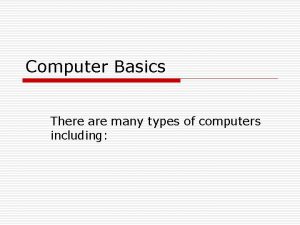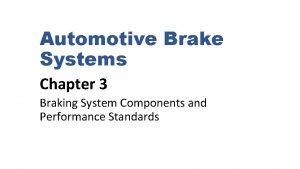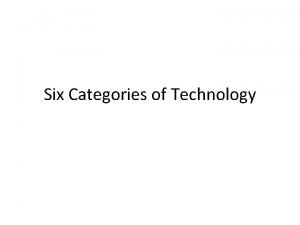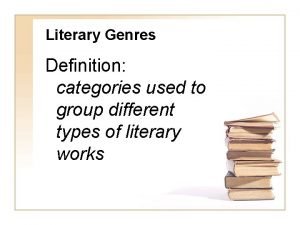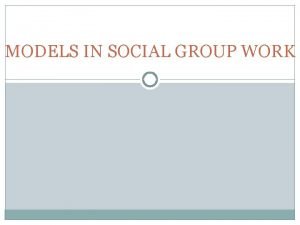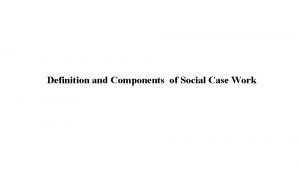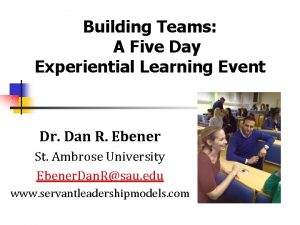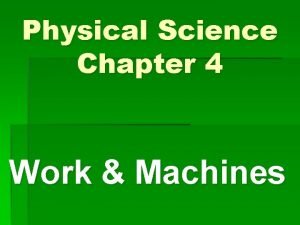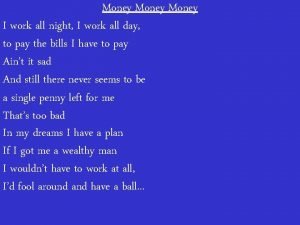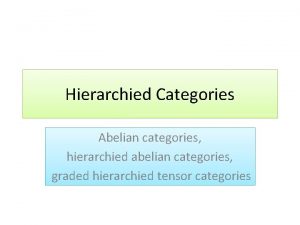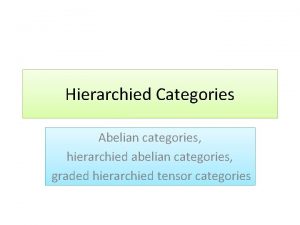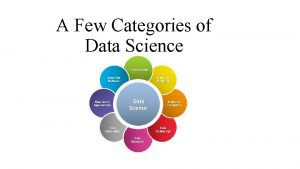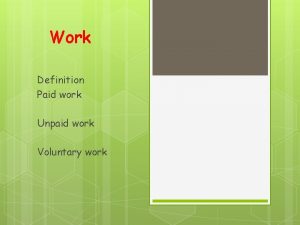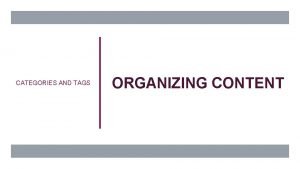World of work Career categories SIX CAREER CATEGORIES



















- Slides: 19

World of work Career categories

SIX CAREER CATEGORIES 1. Investigative 2. Enterprising 3. Realistic 4. Artistic 5. Conventional 6. Social

Six career categories: consider these five aspects Abilities Careers Subjects Interests Thinking and learning

Career categories • Read through pages 60 to 63 and make mind maps for each of the following: 1. Investigative careers 2. Enterprising careers 3. Realistic careers 4. Artistic careers 5. Conventional careers 6. Social careers

The role of work in relation to South Africa’s social and economic needs Identifying need in the community and in South Africa: You belong to: • your family • Your neighbourhood • Your school • Your residential area • Your province • Your country

The role of work in relation to South Africa’s social and economic needs • Every community has needs • These community needs are satisfied by the provision of goods and services. • S. A. ’s main social and economic challenges are to meet the needs of unemployment and poverty • The government needs to provide goods and services such as SHELTER, HEALTH CARE, EDUCATION, RECREATION and TRANSPORT.

Needs of the South African Community Complete activity 11. 2 in your workbook.

How can work meet South Africa’s social needs? • The government supplies water, electricity, housing, police, health services, education, recreation facilities such as sport fields, and transport such as roads and buses. • Where does the government get the money? ? ? • The main source of income is the taxes.

Taxes • Three main taxes: 1. Income tax 2. Company tax 3. Value-added tax (VAT)

Income Tax • Is paid by people who are working. • Working people earn money and part of the money they earn is paid as income tax to the government.

Company tax • Is paid by businesses to the government.

Value-added tax (VAT) • Is paid to the government whenever anyone buys goods or services.

Taxes • These taxes are paid to the government department known as the South African Revenue Service (SARS). • The money from these taxes is used to pay for the services that the government provides. • These services meet the social needs of S. A. • The government also creates work for all the people they employ to provide services to the country.

How can work meet South Africa’s economic needs? • People need to be able to pay for their basic needs in order to ensure South Africa’s economy is strong and growing. • People need to be working and earning money. • If they work for an employer, they receive remuneration for what they do. • If people have their own small businesses, they earn an income from their work.

How can work meet South Africa’s economic needs? • Two of S. A. ’s biggest economic needs are employment and money. • If people are unemployed they do not have the means to meet their basic and social needs. • They cannot afford to pay for goods and services and they do not contribute to S. A. ’s economy in a positive way

Contributing in a positive • Paying tax: – Pay income tax on the money they earn – They use their income to pay for goods and services – taxed (VAT) – The money from those taxes = fees into S. A. ’s economy and increases the amount of money there is to spend on government provision of services.

Contributing in a positive • Spending money: – People who earn money, spend it on goods and services. – This spending = improves S. A. ’s economy by creating a greater demand for goods and services.

Contributing in a positive • Creating jobs: – The more people there are with work and money, the greater the demand for goods and services. – An increased demand creates more work in the businesses that provide those goods and services.

How work meets Social and Economic Needs Complete activity 11. 3 in your workbooks.
 Six basic categories of computers
Six basic categories of computers Components of braking system
Components of braking system Categories of technology
Categories of technology What are the six categories of nutrients
What are the six categories of nutrients Types of utility software
Types of utility software Classify each polygon
Classify each polygon Categories used to group different types of literary work
Categories used to group different types of literary work National fcs standards
National fcs standards Formulas for career success
Formulas for career success World bank indonesia career
World bank indonesia career Example of work immersion in barangay
Example of work immersion in barangay Work immersion objective
Work immersion objective Hard work or smart work
Hard work or smart work I work you work he works
I work you work he works Social group model
Social group model What is social case work?
What is social case work? Team vs group
Team vs group Physics 03-02 potential energy and conservative forces
Physics 03-02 potential energy and conservative forces Section 4 review physical science
Section 4 review physical science I work all night
I work all night
